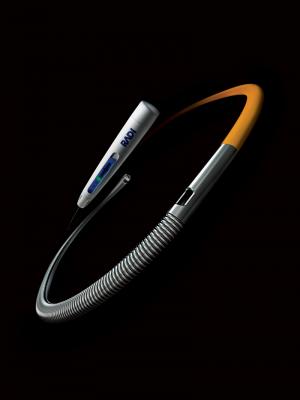
September 7, 2012 — St. Jude Medical Inc. announced results of the FAME II trial demonstrating that patients with fractional flow reserve (FFR)-guided stenting plus the best available medical therapy (MT) had superior outcomes to those treated with MT alone. Results published online in the New England Journal of Medicine (NEJM) and presented during a Hot Line session at the European Society of Cardiology (ESC) Congress 2012 revealed that use of FFR yielded an 86 percent relative risk reduction for unplanned readmission to the hospital with urgent revascularization in patients with stable coronary artery disease.
The FAME II (FFR-Guided Percutaneous Coronary Intervention (PCI) Plus Optimal Medical Treatment vs. Optimal Medical Treatment Alone in Patients with Stable Coronary Artery Disease) trial examined the role of FFR in the treatment of stable coronary artery disease in one or more vessels. FFR specifically identifies which coronary narrowings are responsible for obstructing blood flow to a patient’s heart muscle, and is measured using PressureWire FFR measurement technology from St. Jude Medical. The randomized trial compared percutaneous coronary intervention (PCI) guided by FFR plus the best available MT to MT alone.
“The FAME II trial will improve treatment strategies for patients with stable ischemic heart disease,” said the Society for Cardiovascular Angiography and Interventions (SCAI) in a statement. “With these results, heart doctors gain new evidence to guide decisions about use of PCI. The results of FAME II have been anticipated since earlier this year, when it was announced that an independent safety monitoring board halted the trial early, essentially deeming it unsafe to deny PCI to any study patients whose coronary blockages were found to be significant according to FFR.”
Results from the FAME II Trial:
- At the time trial enrollment ended, primary endpoint event occurrence (death, heart attack or urgent revascularization) was significantly lower in patients with PCI plus MT than in patients with MT alone (4.3 versus 12.7 percent).
- Instances of hospital readmission leading to urgent revascularization were reduced by 86 percent for patients in the FFR-guided PCI arm of the trial. There was no evidence of significant difference in mortality or heart attack between patients with PCI plus MT and patients with MT alone.
- Analysis suggests that the benefits of PCI plus MT may increase over time.
“The FAME II trial provides new evidence-based guidance demonstrating the profound role that FFR and second-generation drug-eluting stents (DES) can have in improving patient care,” said Bernard De Bruyne, M.D., Ph.D., of the OLV Clinic in Aalst, Belgium, and coordinating clinical investigator of the FAME II trial. “Though there have been questions in the past about whether a patient should have a stent or is better off with medical treatment, we now know that if a lesion is significant as determined by FFR guidance, the stenting procedure will provide a better outcome. With this new knowledge, I believe that FFR should become the standard of care for treating patients with stable coronary artery disease and significant coronary narrowings.”
The FAME II trial provides insights about the benefits of coronary intervention and answers questions raised by the COURAGE (Clinical OutcomesUtilizing Revascularization and Aggressive Drug Evaluation) trial. The COURAGE trial demonstrated no difference in the outcomes between PCI plus MT compared to MT alone, but did not require use of FFR measurement technology. FAME II demonstrates that use of PressureWire FFR measurement technology has the ability to make a measurable difference in the outcome of patients. Where FFR found no evidence of ischemia-producing narrowings, patients were treated with medical treatment alone and were followed up in a registry. The rate of primary endpoint events for these patients was low (3 percent), indicating that FFR measurements can be beneficial in directing which patients would benefit from medical treatment.
“As the sponsor of the FAME family of studies, St. Jude Medical is proud to provide the medical community with additional evidence supporting the critically important role that the PressureWire FFR measurement technologies play in improving patient outcomes,” said Frank Callaghan, president of the St. Jude Medical Cardiovascular Division. “Publication of this groundbreaking research in the New England Journal of Medicine coinciding with a Hot Line session during ESC demonstrates that the role of FFR in guiding medical care has moved to broader and more mainstream acceptance within the cardiology community.”
The FAME II trial began enrolling patients in May 2010. At the time enrollment was stopped in January 2012, 1,220 patients with stable coronary artery disease were enrolled at 28 centers across Europe, the United States and Canada. FFR was measured using the PressureWire Aeris or PressureWire Certus from St. Jude Medical. Enrollment was halted after an independent data safety monitoring board (DSMB) found a statistically significant reduction in unplanned hospitalizations and urgent revascularizations in patients enrolled in the PCI plus MT arm of the trial. The DSMB therefore deemed it unethical to continue to randomize patients into the arm of the trial receiving MT alone. As a result, patients already enrolled in the trial continue to be followed, but no additional patients were added.
Health economics data derived from the FAME II trial are expected to be presented later this year.
“FAME II is an important clinical trial in part because it enrolled consecutive patients with stable coronary artery disease, a patient group whose treatment strategy has been the subject of active debate since the 2007 presentation of COURAGE, which ultimately randomized less than 10 percent of eligible patients,” SCAI said in its statement on the trial. “In FAME II, FFR was performed on every patient to confirm that hemodynamically significant blockages in their coronary arteries were limiting blood flow. The patients with hemodynamically significant blockages were then randomized to PCI plus the best medications available or medications alone. “
For more information: www.sjm.com


 January 05, 2026
January 05, 2026 









